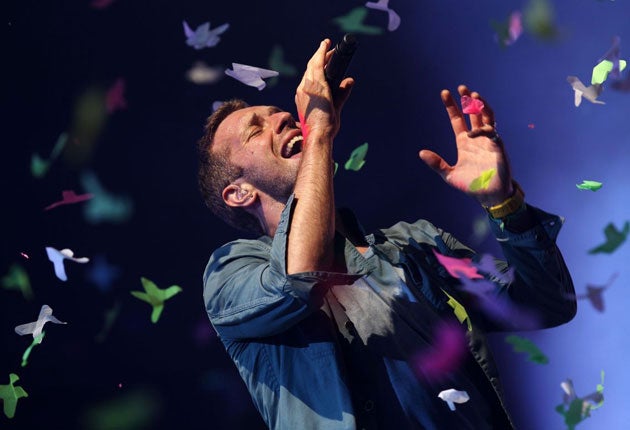Glastonbury: Mud, sweat and tears
The headliners split the crowds but this year's festival showed that the Seventies dream lives on at Worthy Farm. By Nick Hastead

Your support helps us to tell the story
From reproductive rights to climate change to Big Tech, The Independent is on the ground when the story is developing. Whether it's investigating the financials of Elon Musk's pro-Trump PAC or producing our latest documentary, 'The A Word', which shines a light on the American women fighting for reproductive rights, we know how important it is to parse out the facts from the messaging.
At such a critical moment in US history, we need reporters on the ground. Your donation allows us to keep sending journalists to speak to both sides of the story.
The Independent is trusted by Americans across the entire political spectrum. And unlike many other quality news outlets, we choose not to lock Americans out of our reporting and analysis with paywalls. We believe quality journalism should be available to everyone, paid for by those who can afford it.
Your support makes all the difference.This year's Glastonbury Festival was notable for weak headliners, rain, mud, baking sun and a sense that, in its 40th year, this unlikely survivor from days of hippie idealism is still true to itself: a vital, alternative place to escape to, leaving worries and restrictions at the gate.
U2's controversial headlining set on Friday proved the festival's unique requirements and possibilities, by falling so far short of them. The highly publicised protest at the band's decision to base their business in Holland, where it will be virtually untaxed, was invisible and soon forgotten, the campaigners' one inflatable banner quickly, and by some accounts too forcibly, removed.
Bono's struggles to engage in a show he clearly felt to be both important and very far from his stadium-rock comfort zone was far more fascinating. This seasoned star, who has played to far bigger crowds than even the Pyramid Stage, was nervous, his voice strained and weak throughout. On the a capella assault on "Jerusalem" which was his main attempt to reach out for some Glastonbury-shaped version of old Albion, he sounded desperately ragged, a man flailing towards a shore destined to stay out of reach.
Disappointment was universal with everyone I spoke to. But so was the sense that U2's travails weren't of the slightest significance to anyone else's mood. Coldplay went down better on Saturday, though their bland platitudes and second-hand music made me want to retch, while Beyoncé's pumped-up, Hollywood superstar-style Sunday show was the most enjoyable of all; when she adopted her Sasha Fierce alter ego, her pounding drops to her knees and tossing of leonine tresses were mock-ferociously sexy, compensating for the mostly rotten songs. The absence of a truly historic, heart-wrenching and unrepeatable headline set, such as Blur's reunion in 2009, which made Damon Albarn fall weeping on the floor, or Pulp's career-crowning 1990s performances, made 2011 a less than classic festival. Headliners were established, familiar pros, wheeled in to do a job. But such shows are only one high-profile marker of what happens at Glastonbury and not the most important.
The sense of scale of the 15-mile site, so overwhelming when you first arrive, and the sheer number of stages and performers, allows for drift and discovery. On the way to see Radiohead's "surprise" set at the faraway Park Stage (towards which half of Morrissey's crowd also seemed to be heading, to his apparent disgruntlement), I walked past the tiny Bandstand. Raghu Dixit, a star of Indian independent music almost unknown here, had just started an impromptu solo show. His own band had gone AWOL, it turned out, because they had earlier walked straight past the little, park-style stage, not believing that it could possibly be meant to play it. The liberated energy of Dixit's performance was grasped by the hundred or so passing festival-goers who paused to listen and soon found themselves leaping and dancing with the irrepressible singer. When I arrived for Radiohead, their relaxed gig, drawn almost entirely from the last two albums, disappointed everyone I spoke to just as much as U2's. But I enjoyed its unpressured, contemplative nature, a million miles from career cares. Dixit and Thom Yorke's men were simultaneously benefiting from Glastonbury's freeing ambience and benign, curious crowds. It is the only rock festival with some of Womad's interest in musical investigation. Most people seemed up for anything good.
Jarvis Cocker wryly summed up the stupidity of attempts by the straighter world outside to interfere in the festival's running. Commenting on a police request to test Glastonbury's sewage for drug content, refused by Michael Eavis, Cocker wondered who exactly would get the job of rooting through the festival's notorious toilets. "And secondly," he said to cheers. "This is a field where people gather to have a good time. Just leave us alone. It's nobody's business." The relatively tiny number of arrests in a suddenly assembled community of more than 100,000 proves that the fabled spirit of Glastonbury is self-regulating. Though a few utterly zonked drunks were stumbling through the Pyramid Stage's vast grass arena by Sunday's Beyoncé finale, most were being steered by patient friends. The lack of aggression in such a mass of often-inebriated Britons was a sort of miracle – and a tribute to Glastonbury's vast, improvised, successful society.
Join our commenting forum
Join thought-provoking conversations, follow other Independent readers and see their replies
Comments